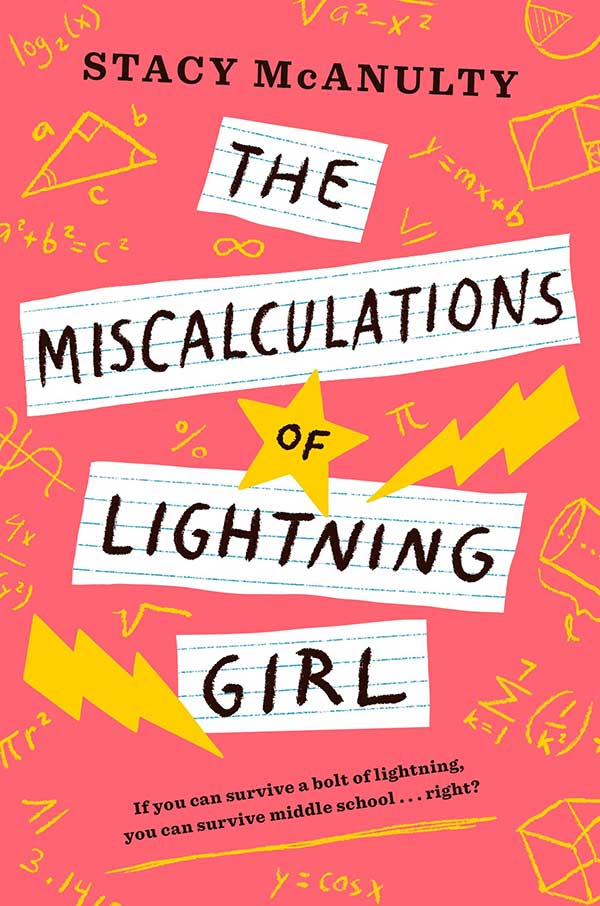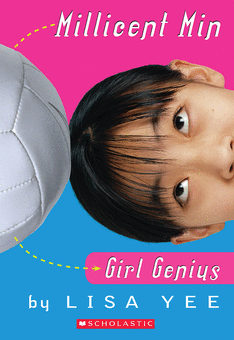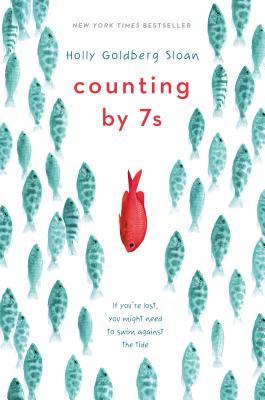Oh, how I love the geeky girl books. Not the books that are geeky, but those with female main characters who are just different. Those interesting, quirky, smarter-than-the-average-bear girls who say what they think, and think about everything. They are my favorite characters in each genre, from Matilda to Calpurnia to Emika to Rosalind*, an eclectic sisterhood of smart and edgy and sometimes awkward young women, lovable yet often isolated by intellect and left alone by peers of their own age. They stand out at every level, but perhaps never more so than in middle grade fiction, especially those titles set in middle school, that Hunger Games of the American education system, when fitting in and keeping your head down may equate directly to survival.
 Stacy McNulty brings us all a new BFF of this group in THE MISCALCULATIONS OF LIGHTNING GIRL (Random House, 5/1). Lucy Callahan, a math prodigy who credits her savant ability to a lightning strike at age 8 (note to self: write future blog post on lightning strikes as foundational character experiences in children’s literature….. see: Brian Selznick, Meg Cabot, Jennifer Bosworth, Len Vlahos). Lucy’s mathematical prowess is coupled with OCD behaviors that make her uncomfortable and stared at in public, and is consequently homeschooled by an understanding grandmother through the 6th grade. (Honestly, I could relate to her need to wipe down public lunch tables with disinfectant, and to carry hand sanitizer everywhere. People SNEEZE a lot.) At the beginning of the story, our young friend has completed high school and two semesters of college online, but her only interactions outside of the apartment, except those with her guardian, are online with a math-problem-solving chat group. Worried for her future, Grandma insists that Lucy complete just one year of public middle school, make a real human friend, and participate in some age-appropriate activity. Lucy, bless her heart, is thrust into the complicated equation of middle school social survival, complete with the algebraic variables of the popular-girl-turned-bully, the friend who can’t keep her mouth shut, and the unsolved for need to not expose too much when you feel like you don’t belong.
Stacy McNulty brings us all a new BFF of this group in THE MISCALCULATIONS OF LIGHTNING GIRL (Random House, 5/1). Lucy Callahan, a math prodigy who credits her savant ability to a lightning strike at age 8 (note to self: write future blog post on lightning strikes as foundational character experiences in children’s literature….. see: Brian Selznick, Meg Cabot, Jennifer Bosworth, Len Vlahos). Lucy’s mathematical prowess is coupled with OCD behaviors that make her uncomfortable and stared at in public, and is consequently homeschooled by an understanding grandmother through the 6th grade. (Honestly, I could relate to her need to wipe down public lunch tables with disinfectant, and to carry hand sanitizer everywhere. People SNEEZE a lot.) At the beginning of the story, our young friend has completed high school and two semesters of college online, but her only interactions outside of the apartment, except those with her guardian, are online with a math-problem-solving chat group. Worried for her future, Grandma insists that Lucy complete just one year of public middle school, make a real human friend, and participate in some age-appropriate activity. Lucy, bless her heart, is thrust into the complicated equation of middle school social survival, complete with the algebraic variables of the popular-girl-turned-bully, the friend who can’t keep her mouth shut, and the unsolved for need to not expose too much when you feel like you don’t belong.
 Lucy tries a standard technique for gifted kids who don’t want to stand out: hiding her brilliance. As she theorizes, “I can hide my superpower. They don’t need to know….. I can fake being normal, and eventually I will be.” Once I sniffled my way to the end of that brave little paragraph, I headed to my bookshelf to pull down another smart friend, MILLICENT MIN by Lisa Yee (Scholastic). This story of an 11-year-old who is completing high school and is allowed to take a college class over the summer (for fun) in exchange for playing volleyball and tutoring a boy echoes all the humorous yet angsty themes of impossibly high academic achievement, and is a standard backlist grab for the bookstore customer with the “really gifted child.” Like Lucy, who finds comfort and peace in solving equations and the calm possible in solitary pursuits, Millicent believes “what my parents kept failing to understand was how happy I was when I was alone with my books. There was no pressure to perform or be cute, and books never disappoint — unless, of course, you’ve chosen a bad one. But then, you can always put it down and pick up another one without any repercussions.”
Lucy tries a standard technique for gifted kids who don’t want to stand out: hiding her brilliance. As she theorizes, “I can hide my superpower. They don’t need to know….. I can fake being normal, and eventually I will be.” Once I sniffled my way to the end of that brave little paragraph, I headed to my bookshelf to pull down another smart friend, MILLICENT MIN by Lisa Yee (Scholastic). This story of an 11-year-old who is completing high school and is allowed to take a college class over the summer (for fun) in exchange for playing volleyball and tutoring a boy echoes all the humorous yet angsty themes of impossibly high academic achievement, and is a standard backlist grab for the bookstore customer with the “really gifted child.” Like Lucy, who finds comfort and peace in solving equations and the calm possible in solitary pursuits, Millicent believes “what my parents kept failing to understand was how happy I was when I was alone with my books. There was no pressure to perform or be cute, and books never disappoint — unless, of course, you’ve chosen a bad one. But then, you can always put it down and pick up another one without any repercussions.”
Millicent understands the order, the control, the calm that comes with mathematics, just like Lucy does. She doesn’t, however, understand that this makes her different. “Just because I once stayed awake for fifty-three hours straight to work out a complicated equation, Mom and Dad think I have an unhealthy obsession with math.”
 “She said that I was highly gifted.
“She said that I was highly gifted.
Are people lowly gifted?
Or medium gifted?
Or just gifted? It’s possible that all labels are curses. Unless they’re on cleaning products.
In my opinion, it’s not really a great idea to see people as just one thing.” Nor can you see Willow Chance, of Holly Goldberg Sloan’s COUNTING BY 7’S (Dial) as just one thing. She is brilliant, she is grieving, and she is a constant observer of the behavior of others, while trying all the while to do what makes her fit in. Her calm narration of her life, with her penchant for list-making and scientific precision, allows the reader to fill in all the emotional support and friendship that she truly yearns for and completely deserves. Just like Lucy and Millicent, Willow wants to apply some rules to life and create some constants that she can rely upon. She can aptly control information, but wants more than anything to find the connection and support of a family and friends. This is the trait that is so very appealing about genius; the ability to grasp the complex and theoretical, and yet to yearn for the simple connection of friends and family while finding those relationships difficult to create and maintain.
“She pulls out a book from a drawer in her desk. 101 Things You Never Knew About Your Best Friend. I know you’re not supposed to judge a book by its cover-and probably not by its title, either-but I instantly want to give it 2 thumbs up or 5 stars. (I’m not sure what scale is used to measure excellence in literature.) There’s a prime number in the title, and the words ‘best friend’. No one has ever called me a best friend. Windy hands me a purple pen …- which I wipe down – … and grabs an aqua pen…. And we get to work. I learn that Windy wants to be an environmental lawyer, she’s afraid of hot-air balloons, and her favorite quote is not from a musical but from a movie. Dumbledore in Harry Potter and the Chamber or Secrets: ‘It is not our abilities that show what we truly are. It is our choices.’ I worry she might know my ability and my secret, and quoting Einstein will only make her more suspicious. So I lie and say my favorite quote is Dory’s famous line from Finding Nemo: ‘Just keep swimming.’ She nods like this makes complete sense.” — THE MISCALCULATIONS OF LIGHTNING GIRL by Stacy McNulty
*from my bookshelf BFF list: MATILDA by Roald Dahl (Penguin); THE EVOLUTION OF CALPURNIA TATE by Jacqueline Kelly (Square Fish); WARCROSS by Marie Lu (Putnam); and AS YOU LIKE IT by William Shakespeare (Folger Shakespeare Library, Simon & Schuster). I’d love to hear your list of girl geniuses, too.
A Tribute to Genius Girls
Cynthia Compton - April 11, 2018
Leave a reply
